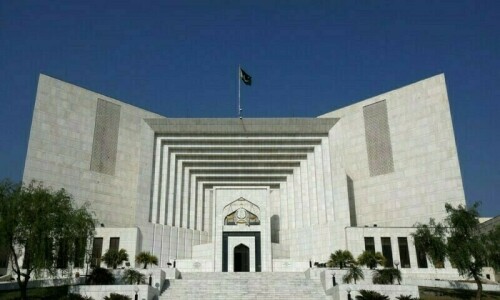ISLAMABAD: The Supreme Court has clubbed a set of ten petitions and applications seeking the court’s intervention in response to allegations of “intelligence agencies’ meddling in judicial affairs”, which were highlighted following a March 25 letter by six Islamabad High Court (IHC) judges.
Headed by Chief Justice of Pakistan (CJP) Qazi Faez Isa, the bench includes Justice Syed Mansoor Ali Shah, Justice Jamal Khan Mandokhail, Justice Athar Minallah, Justice Musarrat Hilali, and Justice Naeem Akhtar Afghan. They will resume the case on April 30, initiated on a suo motu. Justice Yahya Afridi has already recused himself from the bench and will no longer participate.
One of the applications concerns impleadment as a party in the hearing, moved by six members of the Pakistan Bar Council (PBC), seeking an inquiry commission to probe the allegations levelled in the high court judge’s letter.
Constitutional petitions by the Lahore High Court Bar Association also requested the appointment of a judicial inquiry by the Supreme Court judges. Barrister Aitzaz Ahsan also sought a judicial inquiry by the Supreme Court judges, while the Islamabad High Court Bar Association (IHCBA) demanded a probe into the allegations. Similarly, the Balochistan High Court Bar Association and Advocate Shahbaz Ali Khan Khosa also requested an inquiry.
IHC submits proposals before apex court to end interference in judicial affairs; judges unanimous in decision to give an ‘institutional response’
In one of the petitions Barrister Aitzaz Ahsan through his counsel Khwaja Ahmad Hosain had requested the Supreme Court to declare that the allegations by IHC judges, as well as those by Justice (retd) Shaukat Aziz Siddiqui, constitute evidence that the premier intelligence agency namely the Inter-Services Intelligence (ISI), and its operatives were involved in unlawful attempts to influence judicial decisions of IHC and the district judiciary in the federal capital, a development which requires judicial probe.
The Supreme Court initiated suo motu proceedings after former chief justice Tassaduq Hussain Jillani had recused himself from becoming part of the one-man commission established to probe the allegations of the executive’s interference in judicial affairs.
The decision to proceed under Article 184(3) came a day after a group of lawyers and civil society members wrote a letter addressed to the Supreme Court, in which they said the commission was powerless to probe the claims made by the six judges of the IHC detailing harassment at the hands of intelligence officials.
The petition, moved by Aitzaz Ahsan, pleaded that the Supreme Court should declare any interference in judicial affairs as clearly unlawful and unconstitutional, posing a serious threat to the rule of law and the independence of judiciary.
The petition further urged the Supreme Court to instruct the federal government to terminate the service of all such individuals found involved in such unlawful acts, as determined by the judicial commission, without granting them retirement or other benefits from the national exchequer.
And in case of individuals who have already retired to direct that no retirement or other benefits will be paid to them, the petition contended, adding that the government servants including any serving army officer or ISI operatives, who seek to influence the judicial proceedings or judges will be liable to be terminated forthwith from service without any retirement or other benefits being payable to such individual from the national exchequer.
Likewise, the PBC, through a resolution, had asked for a judicial commission manned by sitting judges of the Supreme Court to address the complaints of meddling by intelligence agencies in judicial affairs.
In the resolution, the PBC requested the Supreme Court to decide the present suo motu case as expeditiously as possible.
The resolution emphasised that judges hold the highest esteem in our nation, carrying significant responsibility for adjudicating cases and meticulously deliberating allegations before reaching verdicts.
Similarly, the IHCBA also sought a probe to hold accountable those responsible for undermining the independence of the judiciary.
IHC submits proposals
In a relevant development, the IHC administration has submitted proposals to end meddling in judicial affairs before the Supreme Court.
The IHC registrar filed the report before the apex court’s registrar’s office.
The report will be submitted before the apex court bench hearing the suo motu case.
In its April 3 order, the Supreme Court called for proposals from the main stakeholders in the judicial system and the independence of the judiciary, namely the PBC, SCBA, high courts, and the federal government.
“They should suggest what should be the institutional response and mechanism to address the issues like the ones raised in the letter [of IHC judges] and ensure that such issues do not arise in future and, if they do, to fix liability and proceed against those responsible,” the order said.
In compliance with the Supreme Court’s direction, the provincial high courts as well as the IHC submitted proposals before the apex court.
The IHC’s proposal was based on the minutes of the full court meeting held on April 23.
In the meeting, the judges unanimously decided to introduce several measures, including the reactivation of ‘empowered’ inspection teams to put an end to the alleged meddling of intelligence officials in judicial affairs.
Sources privy to the meeting told Dawn all the high court judges were unanimous that they would not tolerate interference by any intelligence agency in the proceedings of the high court, district courts, and the special courts.
The IHC proposal explained in details how the inspection team would respond to the complaint received from the judges of subordinate judiciary, said the sources.
The judges also decided to give institutional responses against any attempts to interfere in judicial affairs, and the high court, as an institution, would take up the matter with the top authority of the department involved in meddling.
Published in Dawn, April 27th, 2024













































Dear visitor, the comments section is undergoing an overhaul and will return soon.